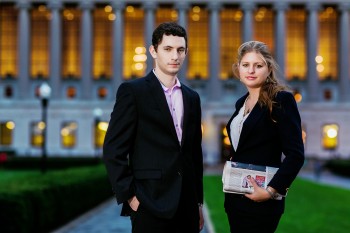Translating the (Russian) News

Aaron Schwartzbaum (left) and Pola Lem, both Class of 2013, provide translations of Russian news stories on their website, russianmediacenter.org.
Details
One of the best things about living and studying in Russia, says Aaron Schwartzbaum '13, was having access to the country's newspapers and magazines.
“A lot of Americans think the Russian media is all propaganda and garbage,” says Schwartzbaum, who spent a year honing his language skills at St. Petersburg State University with the Overseas Russian Flagship Program.“While there is a lot of bluster—especially on television—there are publications that cover the issues in a fairly balanced, thoughtful manner. I felt they deserved a chance to be presented.”
Now the Russian Media Center does just that. The website that Schwartzbaum launched in May (russianmediacenter.org) translates notable Russian articles into English, using an all-volunteer workforce. The roughly 30-member team includes several Haverford grads, including editor in chief Pola Lem '13, Jacki LaBua '13, and Isaac Wheeler '10, as well as current students Hina Fathima '15 and Tamar Hoffman '16.
"The idea was to present a more rounded picture of what's happening in Russia,” says Schwartzbaum, now a New York-based financial analyst.Since its start, the site has posted more than 150 articles. One piece Schwartzbaum translated, which posits that the current crisis in Ukraine has been worsened by a lack of U.S. analysts with a deep understanding of how Moscow works, was picked up by the London newspaper The Guardian.
Thus far, russianmediacenter.org tops out at 150 visitors each day. But Lem, the site's top editor, says she can easily see that number growing.
“Russia is in the news all the time now,” says Lem, who also spent a year in St. Petersburg with the Russian Flagship Program and is now pursuing a master's degree at the Columbia University Graduate School of Journalism.“It's the most important Russia has been since the collapse of the Soviet Union, [but] the vast majority of Americans have no idea what Russia looks like from the inside. Even reading an article that is written by government-controlled media … is valuable in its way.”
Among the website's biggest challenges going forward: Expanding the work force. To that end, Lem says she will be looking for more editors, and will also be reaching out to other schools with Russian language programs, seeking students who want to hone their translation skills. It's hard to attract quality workers without a financial reward, says Lem. As a result, she and Schwartzbaum will make finding funding for the site another priority.
“We'd love to offer some incentives besides fame and glory,” says Lem.
The Russian Media Center team also has concerns about the Russian media itself. Some of the publications that Schwartzbaum has admired for their critical tone are being pushed aside, drained of readers, or purchased by President Vladimir Putin's supporters. Schwartzbaum has noticed a change in the recent articles about the situation in Ukraine: The dispatches come across as“Just the facts, ma'am”-type rehashes. While anti-war rallies do get coverage, Schwartzbaum wonders if that's only so the government can appear to show openness while also allowing a frustrated populace to let off steam.
And the situation could get worse: In September, the Russian government took steps to extend control over independent media when the lower house of Parliament passed a bill limiting the amount of foreign ownership in local media outlets. Among the publications that would have to be sold or close if the bill passes the lower house and is signed into law by the president is the business daily Vedomosti, which last summer reported on a $41 billion government bailout sought by an oil company headed by a Putin ally.
Still, Lem is optimistic about the Russian Media Center's future.“Services like the RMC are not only going to be in demand,” she says,“they're critical to helping readers understand what Russia is all about.”
—Natalie Pompilio



